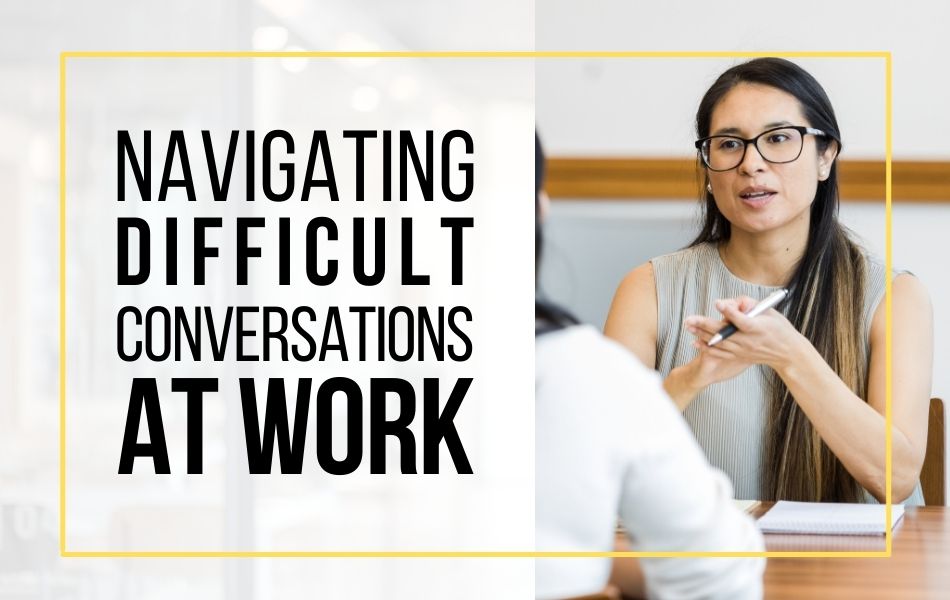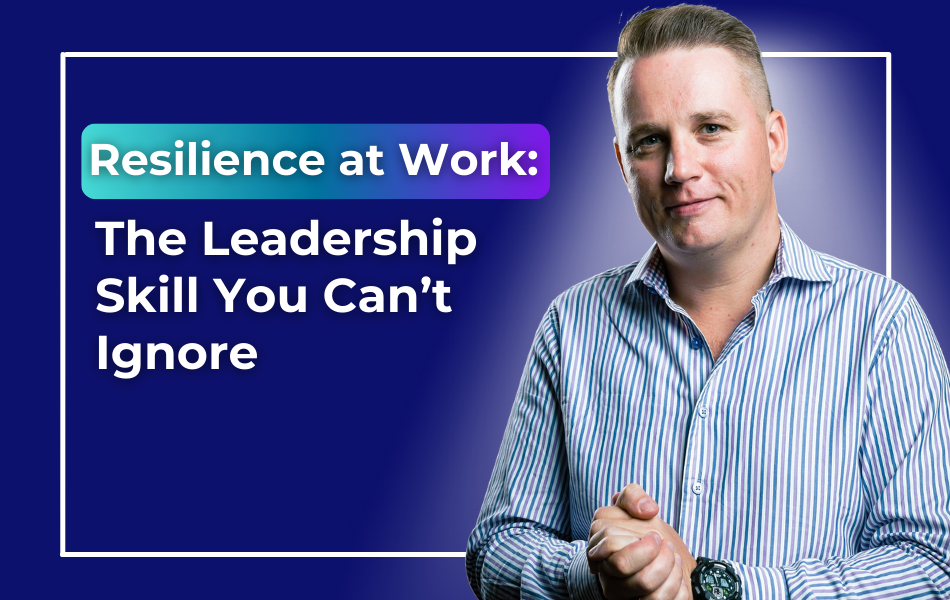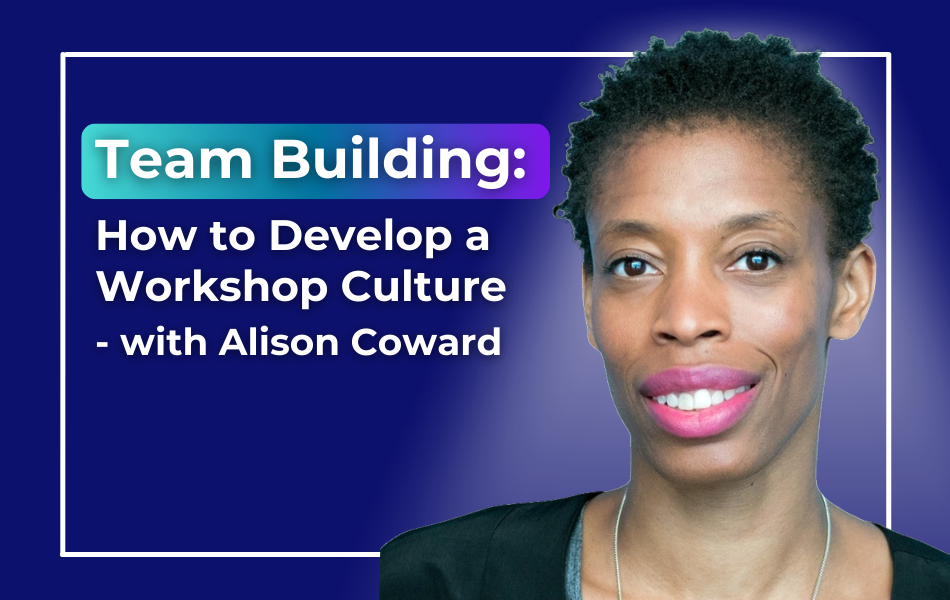
6. Navigating Difficult Conversations at Work
About this Podcast
Most of us dread the difficult conversations we know we should have but would really prefer not to have. In this episode, we discuss how to take the pressure out of it and how to hold these conversations with greater ease.
– YOU’LL FINISH THE EPISODE KNOWING –
1) The 2 mindset shifts to make to drop the barriers and make it a lot easier to have these conversations right when they come up
2) How to best prepare if you know a difficult conversation is overdue
3) The 3 phases of difficult conversations and the 25-50-25 rule to make them significantly more effective
4) Plus, what to do if emotions run high
Ramona Shaw [00:00:03]:
Welcome to the manager track. The leadership podcast where we help ambitious managers across the ranks become confident and competent leaders people love to work for. I’m your host, Ramona Shaw. In today’s episode, we’re gonna talk about how to navigate difficult conversations. You know, those conversations, when you feel like, ah, I should say something I feel something, but I don’t know how to communicate that. Something’s spotter me, but I don’t wanna create a conflict or ruffle any feathers But, you know, there’s something deeper inside of you, something that you’re feeling or thinking that you’re not actually communicating. That’s kinda what makes difficult conversation difficult, right, because there’s more than what the eye can see. And I bet you can resonate and relate to some of those experiences that you’ve had in the past, or maybe a difficult conversation that’s coming up that you know you need to hold.
Ramona Shaw [00:00:55]:
So during this podcast, I’m going to tell you a little bit more about what makes conversations difficult gonna dive into how to navigate those, meaning how to actually hold those conversations so that they’re effective and you’re responding well to their feedback and their comments, and you’re actually getting to a solution by the end of versus letting it go on and on and on, right, because you’re having one argument versus the other. By the way, this is based on a training set that I held with the members of the leadership circle. If you’re looking for ongoing in-depth trainings and coaching, in a group environment where people who are in similar shoes, who are leading and trying to consistently learn and grow as a leader to their team, then check it out at www.ramonashaw.comforward/leadership dash circle. So let’s kick it off. So what makes conversations really difficult? So there’s been a lot of research on this, and The common understanding is that there’s really 3 factors that go into this. Number 1, stakes are high. This means that you’re talking about something that matters. Right? It’s not about what to have for dinner.
Ramona Shaw [00:02:10]:
Should you go to this restaurant or to another braun or which movie to watch, those are not typically considered difficult conversations. It’s really something that matters. like salary negotiations or feedback about performance or behavior or conveying a difficult message. especially in the current time where we’re going through economic challenges and the COVID 19 crisis, you may have to communicate a difficult message, be the messenger of something that’s hard for others to digest. Right? So those are diff difficult conversations. Number 2, opinions are opposing. So you may think you’re right. The other person may think they’re right.
Ramona Shaw [00:02:50]:
You may think it’s a good idea that the other person may not see it that way. They may not agree with the decisions that have been made or the course of action you or others have taken. Number 3, emotions are high. Right? It’s something that matters to people. And when those 3 criteria are met, we would consider those critical conversations. Now there’s also an internal part is that it’s generally when we want 2 different things. So for example, we want them to stop doing something. like, stop being late to meetings as an example.
Ramona Shaw [00:03:32]:
But at the same time, we also want them to like me. So now I have this conflict that I feel the tension, the dilemma, that either I can tell them, and give them the the tough feedback and to hold them accountable. But then I might jeopardize them liking me, and I kind of want both. So then we’re in the situation where we have to choose, and that internally, that internal dilemma makes it difficult. Now if you have complete authority and you don’t care what the other person thinks and you’re just giving a command, for example, or you’re giving that feedback and you don’t care, then it’s usually not difficult. It’s like giving an order. That is not a difficult conversation, but it’s often that we do care what they think in so this inner dilemma occurs. Now if we avoid the problem, because we sense the dilemma, What happens over time is that we can start feeling taken advantage of.
Ramona Shaw [00:04:29]:
Our feelings may faster. may we may feel weak because we feel like we don’t have a voice or we’re not really speaking up. or we may also notice that we lost an opportunity to improve things. But then on the other hand, right, if we confront the problem, then things could get worse. So that is that struggle. And like anything else, it boils down to this success principle, that you have to prioritize long term benefits over short term gains. Right? So, yes, it’ll be uncomfortable in the moment. But whenever you recognize that there will be long term benefits, that exceeds the short term pain, you know which way to go.
Ramona Shaw [00:05:17]:
Right? Now If you’re struggling with this, know that you are not alone. I wanna cite some research that has been published by Harris Pool and HBR. In that piece of research, it says that 69% of managers said that they’re uncomfortable communicate with their team members. 69%. That is huge. They’re feeling uncomfortable communicating. So if you have the experience that you feel It’s a struggle or it’s uncomfortable, then, no, there’s nothing wrong with you and nothing wrong with your leadership style. It’s just part of the chop.
Ramona Shaw [00:05:54]:
Now 37% of the managers that were surveyed are uncomfortable giving feedback. which also means that if you feel this discomfort, you’re not alone. Now the key here is that even though it is uncomfortable to communicate, to have difficult conversations, to give feedback, you still do it. You do it anyways. Now there are a few things that I can share with you to make this easier. Right? So in the moment when you realize this is what’s going on. And, yes, there’ll be short term suffering, but there will be a long term benefit that outweighs my short term suffering, then you know what you need to do. You need to have that conversation.
Ramona Shaw [00:06:42]:
as soon as possible. Okay. So I was saying that there are a few things that can make this easier. And I wanna start off by talking about the mindset. Because when we shift our mindset about the conversation and we don’t see it as such a difficult, hard thing, an uncomfortable thing. But if instead, we look at it as an opportunity to learn and to grow, we’re taking so much of the pressure and the weight off of our shoulders. So there’s 2 things to consider. Shift your mindset from thinking that this is about delivering your viewpoint or delivering your feedback? Scratch that.
Ramona Shaw [00:07:24]:
and look at it as I’m learning. I’m learning about our relationship and about our communication and about you. So shift your mindset from thinking that this is about delivering a message to learn and to grow personally and together. The second mindset shift to keep in mind is that you wanna move away from blaming others. the moment you start a conversation with wanting to blame or having the urge to blame the other person for what happened, That is when it usually goes south. So instead, you approach the conversation with the mindset that there has been shared contribution to the problem. Even if you give feedback to a person who is consistently coming late to meetings and using, I have absolutely nothing to do with this. This person is coming late.
Ramona Shaw [00:08:20]:
Why would this be my fault? Well, take a step back. and think maybe I’ve tolerated it too long, and they don’t think it’s a problem. Maybe they have seen me come late before, and so they think it’s acceptable. maybe I allowed this by recapping what we’ve talked about the first five minutes when they joined the meeting. So, therefore, they don’t really see the need to be there on time because they don’t miss anything. So what is it that you have contributed? There’s always always an opportunity to look at this from the perspective of shared contribution. Now the second thing that makes difficult conversations so much easier is preparation to really prepare for that difficult conversation and not walk in trying to wing it. That would usually cause a bigger mess, and then you spent more time trying to rectify the problem that was caused during this difficult conversation.
Ramona Shaw [00:09:19]:
So when you prepare, take a piece of paper in a pen and just get everything out of your system right down all the things that you wanna say and that you believe are true. And then stop, pause, and ask yourself Wait a second. What’s the problem from their point of view? Then ask, what am I right about and what could they be right about? What might their intentions be, and what might they be feeling? So putting yourself in their shoes. Writing this down will put you into that might write mindset of shared contribution and that mindset of learning, the two things that we talked about earlier. Then ideally, you can let that sit for a couple of hours or even overnight. Then when you get back to it, take out any church language. formulate some key bullet points of things that you wanna get through in your conversation. And before you start any difficult conversation, make sure that you’re in a calm state.
Ramona Shaw [00:10:24]:
Does this mean that you wanna breathe? Does this mean you wanna meditate? Maybe go on a walk. maybe go, get some coffee. Take a break. Whatever that is, that makes you feel more at ease. do that before you walk into a difficult conversation. So now let’s talk about what to do when you actually find yourself in the difficult conversation. There’s 3 phases that difficult conversations usually go through. And I like the principle or the the framework of having 2550, 25 percent allocated to each of those 3 phases, which means phase 1, 25%, phase 2, 50% of the time, and then phase 3, 25% of the time that you’re talking.
Ramona Shaw [00:11:10]:
So what are those faces? Number 1, the 1st phase is all about sharing your experience. And there’s 3 aspects of this. You wanna share the facts that you have observed in the situation, You wanna share the feelings that you had. And then you wanna share the impact that whatever happened had on you or possibly on others too. So you could easily say something such as, I don’t know whether you intended this, but I felt uncomfortable when you cut me off during that meeting with the client. So you shared a fact someone cut you off, right, so It must have been observable by others that you couldn’t finish the sentence. That’s what a fact is. It’s observable.
Ramona Shaw [00:11:54]:
If you had a camera, it would have captured it or a video recorder. It would have captured it. That’s the fact. Then there was a feeling about it that you felt uncomfortable and the impact that you did not like it. But you’re also softening it by saying, I don’t know whether you intended this. Okay. So in that 1st phase, by 25% of the time, you wanna share your experience based on facts, feelings, and impact. Then you move into that second phase.
Ramona Shaw [00:12:24]:
In the second phase, you aim to understand the other person, the facts that they’ve observed, the feelings they had, and the impact actions or situations or behaviors had on them. Now this is the phase where we wanna dedicate 50 percent of the time to. And this is also where most conversations go wrong because that percentage allocation is usually 50% of the time, I’m talking about my feelings, my impact, and then giving a little bit of room for you to react And then I go right back into justifying why I feel, why I what I experienced might impact on me. But do really navigate a difficult conversation effectively. You really wanna stick to 25% about you, 50% about the other person. You can ask things such as, can you say a little bit more about how you see things? What information might you have that I don’t? How do you see it differently than I do? What impact have my actions had on you? Can you say a little bit more about why you think this is my fault? How are you feeling about all of this? These are all questions that get the other person talking. So that was phase number 2. Now phase number 3 is about the solution at that point, that remaining 25 percent of the time based on this framework.
Ramona Shaw [00:13:51]:
Right? It’s never mesh it exactly that way, but just to keep that in mind, is about the solution and no longer the problem. So you’re basically moving on talking about the problem, and you don’t let yourself go back into that problem discussion. And if your counterpart goes back to talking about the problem, then you can guide them back and say, like, I know, you know, this we talked about the problem. I would really like to focus our con conversation on the solution now. Can we agree? So when we’re in phase 3, what’s really important is that you wanna let go of your primal need. And I was saying primal need because we all have it. to need to be right. Wanting to be right or needing to be right doesn’t give you anything.
Ramona Shaw [00:14:40]:
Even if you are being right and you then walk away, the other person knows, okay, were you were right, you walk away and you think I was right, it is not a win. It’s still a lose because You feel disconnected. You as the person feeling right feels disconnected, the person who thinks that you’re right, because you convinced them somehow, also feels disconnected. It’s a lose lose. And one on the other hand, you get over the need to be right and your aim is to be effective. then that’s what eliminates the need for defensiveness. The other person feels hurt. and you can actually have that conversation around his illusion.
Ramona Shaw [00:15:24]:
You could say something such as It doesn’t matter which one of us is right about that. Our current way of interacting doesn’t work for me. and I wanna find a way that works for both of us. So let’s talk about possible solutions. That helps you take that conversation forward and actually get to a good outcome. Now if you notice the other person keeps going back to the problem, then it might be that they don’t feel hurt yet. And people will resist until they feel hurt. So acknowledge their feelings by letting get a person know that what they have said has made an impression on you.
Ramona Shaw [00:16:07]:
that their feelings matter to you and that you’re doing your best to understand their feelings. ask more questions. Ask what they’re looking for from you. What they need from you or from someone else. so that they can start talking about a solution. So if they resist any solution, then go back and make sure that they feel hurt. That’s the key to really come to a good outcome that works for everyone involved. So let me do a quick recap.
Ramona Shaw [00:16:40]:
We started off talking about what our difficult commerce emotions. Right? From the outside, stakes are high, opposing opinions, and emotions run high. And then on the in in the inner world, we have this dilemma of wanting 2 things, wanting to give the feedback, or wanting to ask for a race, but also not wanting to create conflict or ruffle feathers or still wanting to be liked because it is internal dilemma. Now the shift in our mindset that we need to do is moving from delivery of a message to learning about us and yet a person and growing together. And moving from this idea of blaming to this idea of having shared contribution, shared contribution in the problem, and there’ll be shared contribution in the solution. Then we talked about the importance of preparing and the questions you wanna ask yourself. And then we talked about the 255025 rule for the 3 phases of the actual conversation. So sharing your experience, aiming to understand that their experience and then moving into a conversation about a solution.
Ramona Shaw [00:17:48]:
Right? Talked a little bit about being right and letting go of that and trying to be effective instead. Now I want you to go out there and put this to use right away. So think about a conversation that may feel uncomfortable that you know you need to have. for the long term benefit, even though it might be uncomfortable in the moment. And then prepare and hold that conversation as soon as possible. If you find this episode helpful, then please subscribe to this podcast, and it’d be amazing if you could also give it a review so that other people can find this podcast as well and benefit from the ideas and the thoughts and perspectives and advice that I’m sharing with you here on the ManagerTrack podcast. And that’s all for today, and I’ll catch you next time.
- What strategies do you currently use to let go of the need to be right during a difficult conversation?
- What techniques do you use to demonstrate curiosity in order to understand the other person’s perspective during a difficult conversation?
- Have you ever found it challenging to transition from discussing the problem to focusing on finding a solution? How did you handle it in the past and what steps could you take to handle it better in the future?
- What are some steps you can take to prepare yourself mentally and emotionally before having a difficult conversation? Do you have a framework that you have decided on in advance to help alleviate the need to come up with a framework on the spot when emotions may be higher? If not, spend some time thinking about what that framework would look like.
- Can you think of a time when you realized your own contribution to a problem and how you addressed it during a difficult conversation? What phrases would be useful in a similar situation in the future?
Resources mentioned
- The Leadership Circle mentioned in the episode has closed. For Ramona’s currently open services visit https://www.ramonashaw.com/work-with-me/
- Learn how to turn your 1-on-1 meetings from time wasters, awkward moments, status updates, or non-existent into your most important and valuable meeting with your directs all week. Access the course and resources here: ramonashaw.com/11
- Have a question or topic you’d like Ramona to address on a future episode? Fill out this form to submit it for her review: https://ramonashaw.com/ama
Grab your copy of Ramona’s best-selling new book ‘The Confident & Competent New Manager: How to Rapidly Rise to Success in Your First Leadership Role’: amzn.to/3TuOdcP
If this episode inspired you in some way, take a screenshot of you listening on your device and post it to your Instagram Stories, and tag me @ramona.shaw.leadership or DM me on LinkedIn at linkedin.com/in/ramona-shaw
Are you in your first manager role and don’t want to mess it up? Watch our FREE Masterclass and discover the 4 shifts to become a leader people love to work for: ramonashaw.com/masterclass
Don’t forget to invest time each week to increase your self-awareness, celebrate your wins, and learn from your mistakes. Your career grows only to the extent that you grow. Grab your Career Journal with leadership exercises and weekly reflections here: ramonashaw.com/shop
Love the podcast and haven’t left a review yet? All you have to do is go to ramonashaw.com/itunes and give your honest review. Thanks for your support of this show!
* Disclaimer: Shownotes may contain affiliate links. That means that I am awarded a small commission for purchases made through them, at no added cost to you.







